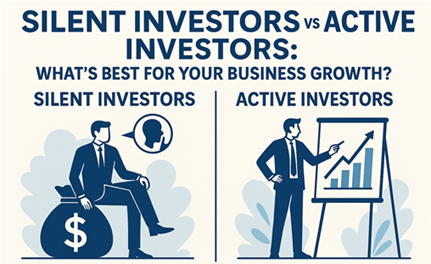When growing a business, securing capital is only half the battle. The type of investor you bring on board can significantly impact your company’s direction, speed of growth, and long-term success. Entrepreneurs often face a crucial decision: silent investors vs active investors—which is the better fit?
Understanding the roles, benefits, and drawbacks of each investor type is essential. Let’s break it down.
Who Are Silent Investors?
Silent investors, sometimes known as “sleeping partners,” are individuals or firms who provide capital to a business without being involved in its daily operations. Their contribution is strictly financial.
Key Characteristics of Silent Investors:
- No active role in decision-making
- Rarely attend meetings or offer advice
- Expect periodic returns or equity growth
- Prefer a “hands-off” investment approach
- Often involved in multiple ventures simultaneously
These investors typically trust the founding team or management to grow the business while they collect profits from behind the scenes.
Who Are Active Investors?
Active investors go beyond just funding a business. They often bring hands-on involvement, guidance, mentorship, and sometimes even a seat at the decision-making table.
Key Characteristics of Active Investors:
- Offer strategic direction and mentorship
- Participate in major decisions
- May require board seats or voting rights
- Use their networks to accelerate growth
- Monitor performance closely
They often view their role as a partnership, not just a financial transaction.
Comparing Silent vs Active Investors: Pros and Cons
To determine which investor suits your business better, you must evaluate your needs across several dimensions: control, experience, funding stage, and growth goals.
| Feature | Silent Investors | Active Investors |
| Control & Autonomy | Full control retained by founders | Shared control and input from investors |
| Expertise | Limited business input | Valuable mentorship and experience |
| Time Commitment | No interference in operations | Regular interaction and feedback |
| Funding Stage Fit | Better for mature or passive investments | Ideal for early-stage or scaling startups |
| Risk Tolerance | More risk-averse | Often willing to take calculated risks |
| Growth Support | Limited beyond funding | Offers networking, hiring, partnerships |
When to Choose a Silent Investor
Silent investors are ideal if:
- You already have a strong leadership team.
- You want to retain full operational control.
- You’re looking for passive capital without oversight.
- You have a well-established or low-maintenance business model.
Silent investors work well in industries like real estate, retail, or franchises, where growth strategies are proven and founders don’t need strategic input.
When to Choose an Active Investor
Active investors are a better fit when:
- You need mentorship or industry connections.
- Your business is in an early or high-growth phase.
- You value strategic advice and collaboration.
- You’re open to feedback and external oversight.
Startups in tech, health, or fintech often benefit from the involvement of experienced VCs or angel investors who help fine-tune product-market fit and scale operations faster.
Hybrid Models: Can You Have Both?
Yes. Many businesses opt for a hybrid approach, mixing both types of investors. For example, you might take on an active investor as a lead partner, while also bringing in silent investors for additional capital without diluting decision-making power.
This balance can provide the best of both worlds—funding plus guidance, without overwhelming the founding team with too many voices.
Key Questions to Ask Before Choosing
Before deciding, ask yourself:
- How much control am I willing to give up?
- Do I need guidance or just capital?
- Is my business maturing enough to run independently?
- Am I open to having investors involved in strategic decisions?
- Can I leverage the investor’s network for growth?
The answers will help you determine which investor type aligns with your vision.
Conclusion: Choose the Investor That Matches Your Business Vision
There is no one-size-fits-all answer to the silent investors vs active investors debate. It depends entirely on your business stage, leadership strengths, industry, and long-term goals. If you’re confident in your ability to execute and want full autonomy, silent investors are ideal. If you crave guidance, partnerships, and strategic oversight, active investors are your best bet.
Align your investor choice with your growth strategy—and watch your business thrive.
Who we are: Funded.com is a platform that is A+ BBB accredited over 10+ years. Access our network of Angel Investors, Venture Capital or Lenders. Let us professionally write your Business Plan.





 Rss Feed
Rss Feed


